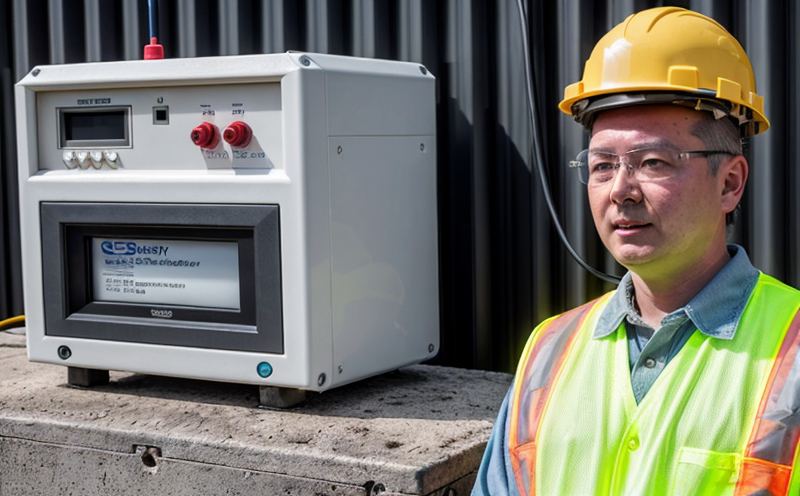Testing battery safety under international IEC 62133 safety standards
Ensuring Battery Safety Why Testing Under International IEC 62133 Standards is Crucial for Businesses
In todays fast-paced world of technology and innovation, batteries have become an essential component in various industries, from consumer electronics to electric vehicles. With the increasing demand for portable power sources, manufacturers must prioritize battery safety to prevent accidents, injuries, and reputational damage. This is where Testing battery safety under international IEC 62133 safety standards comes into play a critical laboratory service provided by Eurolab that ensures your batteries meet the highest safety standards.
The Importance of Battery Safety
Battery safety testing is not just a regulatory requirement; its a moral obligation for manufacturers to protect consumers and prevent potential hazards. A single faulty battery can lead to devastating consequences, including
Fires and explosions
Electrical shocks and injuries
Environmental damage
Loss of business reputation and revenue
To mitigate these risks, international organizations have established strict safety standards for batteries, including the IEC 62133 standard. This comprehensive guide outlines the essential testing procedures to ensure your batteries meet the highest safety standards.
What is IEC 62133?
IEC 62133 is an international standard that specifies the requirements and test methods for rechargeable lithium-ion (Li-ion) cells and batteries, as well as nickel-metal hydride (NiMH), nickel-cadmium (NiCd), and lead-acid batteries. The standard covers various aspects of battery safety, including
Electrical safety
Thermal runaway
Flammability
Chemical stability
By testing your batteries under IEC 62133 standards, you can ensure they meet the necessary requirements for certification and compliance with international regulations.
Benefits of Testing Battery Safety Under IEC 62133 Standards
Implementing battery safety testing under IEC 62133 standards offers numerous benefits for businesses
Compliance with International Regulations Meet regulatory requirements for batteries used in various industries, such as consumer electronics, electric vehicles, and renewable energy systems.
Reduced Risk of Product Liability Minimize the risk of accidents, injuries, and financial losses associated with faulty battery products.
Improved Brand Reputation Demonstrate your commitment to safety and customer well-being by adhering to strict international standards.
Increased Efficiency Streamline product development and testing processes by understanding potential risks and weaknesses in battery design.
Enhanced Customer Trust Provide customers with confidence in the safety and reliability of your batteries, leading to increased sales and revenue.
Key Benefits of Eurolabs Battery Safety Testing Services
Our comprehensive laboratory services include
Electrical safety testing (e.g., short-circuit, overload)
Thermal runaway testing
Flammability testing
Chemical stability testing
By partnering with Eurolab for battery safety testing under IEC 62133 standards, you can
Save Time and Resources Our experienced team will guide you through the testing process, ensuring efficient and accurate results.
Access Expertise Leverage our in-depth knowledge of international regulations and industry best practices to ensure your batteries meet the highest standards.
Minimize Costs Avoid costly rework, product recalls, or legal liabilities by identifying potential safety issues early on.
Frequently Asked Questions (FAQs)
Q What types of batteries can be tested under IEC 62133 standards?
A Our laboratory services cover rechargeable lithium-ion (Li-ion), nickel-metal hydride (NiMH), nickel-cadmium (NiCd), and lead-acid batteries.
Q Why is it essential to test battery safety under IEC 62133 standards?
A Battery safety testing ensures compliance with international regulations, reduces the risk of product liability, and improves brand reputation by demonstrating a commitment to customer safety and well-being.
Q What is the typical turnaround time for battery safety testing services?
A Our experienced team will work efficiently to provide you with accurate results within an agreed-upon timeframe, usually 2-6 weeks depending on the scope of work.
Q Can Eurolab help with product certification under IEC 62133 standards?
A Yes, our comprehensive laboratory services include certification and compliance support for various international regulations, including IEC
Conclusion
In conclusion, testing battery safety under international IEC 62133 safety standards is a critical component of any business operating in the battery industry. By partnering with Eurolabs expert team, you can ensure your batteries meet the highest safety standards, reducing risks and increasing efficiency while maintaining compliance with international regulations. Dont compromise on battery safety choose Eurolab for all your laboratory testing needs.
Why Choose Eurolab?
As a leading provider of laboratory services, Eurolab is committed to delivering high-quality results that meet your business objectives. Our team of experts will guide you through the testing process, ensuring efficient and accurate results while maintaining confidentiality and data security.
-
Verifying battery protection against electrical, mechanical, and environmental hazards
-
Simulating short circuit, overcharge, and thermal abuse conditions for compliance
-
Assessing battery performance under various stress tests for IEC 62133
-
Measuring the risk of fire, explosion, or chemical leakage during compliance testing
-
Testing for compliance with IEC 62133 for consumer electronics batteries
-
Evaluating the robustness of battery cells and packs against physical damage
-
Ensuring safety compliance for batteries used in medical devices and wearables
-
IEC 62133 compliance testing for batteries used in electric vehicles
-
Determining battery safety during overcharge, deep discharge, and short-circuit scenarios
-
Assessing battery design features to meet IEC 62133 safety requirements
-
Simulating abusive conditions to ensure compliance with IEC 62133
-
Testing for safe operation and disposal of batteries according to IEC standards
-
IEC 62133 compliance testing for batteries in energy storage and industrial applications
-
Evaluating safety features in battery management systems for IEC compliance
-
IEC 62133 testing for batteries used in aviation and aerospace
-
Assessing the thermal stability of batteries under compliance testing conditions
-
Verifying battery casing and packaging against impact and puncture risks
-
Measuring voltage, current, and temperature limits during compliance testing
-
Testing for compliance with international battery safety standards for transport




